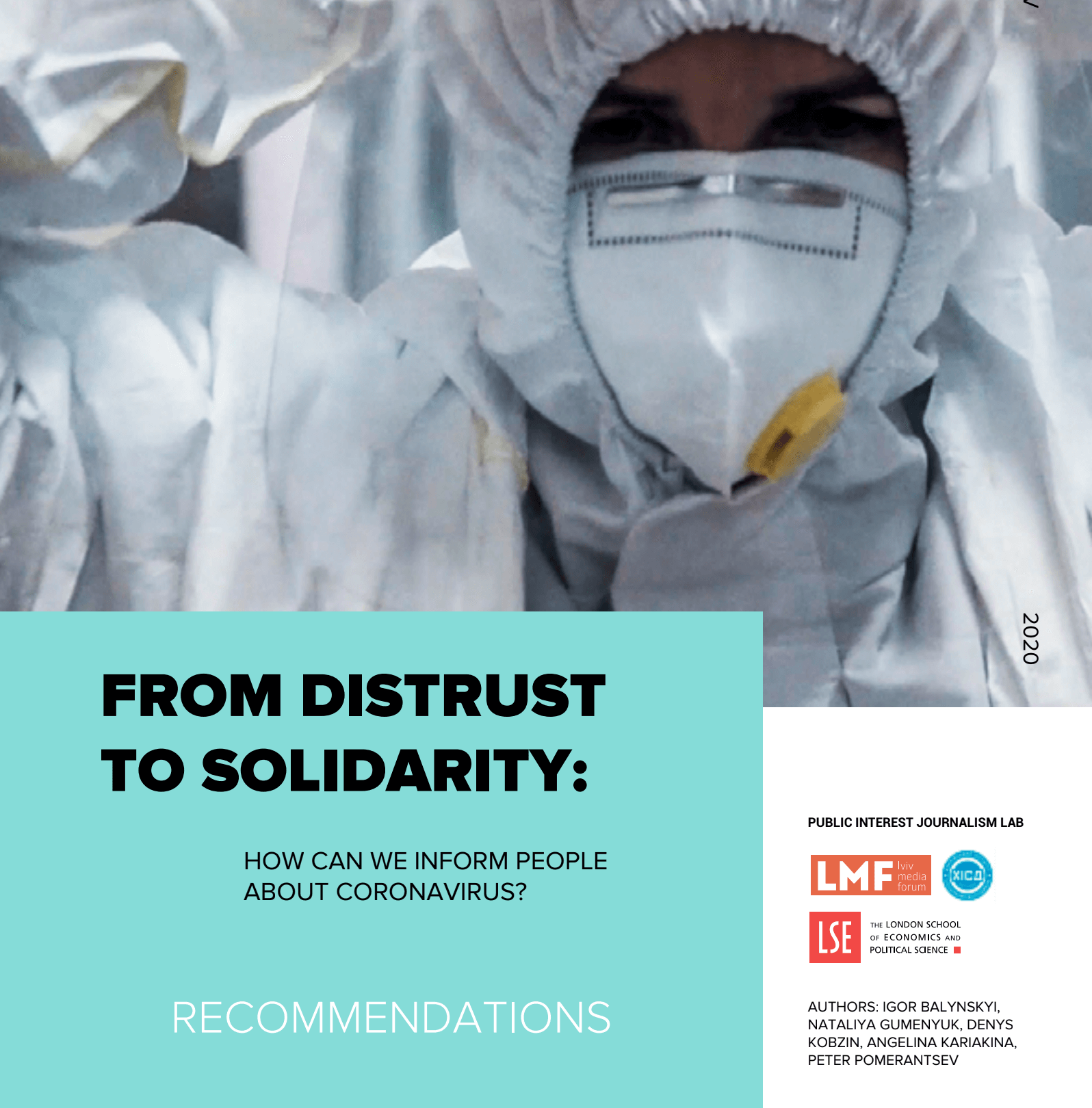How To Produce Constructive TV News Reports On Corona
“The main instruction to citizens during this time of crisis has been one of inaction, which created a feeling of powerlessness. We wanted to produce reports showing how citizens may regain a sense of control, but also use sociological research to test whether our approach works.”
Nataliya Gumenyuk, Editor
Ukrainian journalists co-operated with local and international sociologists to investigate what type of content may reduce anxiety and a sense of powerlessness. They filmed 5 stories according to the principles of constructive journalism for the Ukrainian Public Broadcaster.
How They Did It
The pilot project by the Public Interest Journalism Lab was a joint interdisciplinary project by Ukrainian and British journalists and sociologists, with contributions from the Arena programme at the London School of Economics (UK), the Lviv Media Forum (Ukraine) and the Kharkiv Institute of Social Research (Ukraine). The aim was to develop editorial strategies during the COVID-19 pandemic. The journalists worked first with researchers in order to better understand Ukrainian citizens’ attitudes towards the pandemic and discover which types of stories people trust and which angles and information relieve their anxiety.
After producing 5 constructive news reports a series of in-depth interviews were conducted where respondents watched the videos and shared their reactions, answering broader questions on their attitudes to the pandemic and how COVID-19 is covered by the media.
Based on the research findings, the team compiled recommendations on how to cover COVID-19 which were shared among national and local media and aimed to foster trust (link below).
Solidarity and neutrality help foster trust
The project was based on the assumption that stories about mutual assistance and solidarity can re-establish a sense of control over a crisis situation instead of viewers being overcome by anxiety, confusion and hopelessness.
The team created 5 original videos based on constructive journalism principles. They portrayed Ukrainian designers making protective gear for doctors, an innovative lab that reorganized its work to make masks for doctors using 3D printers, a hotel that provided free stays for medics who live outside of the Ukrainian capital and who couldn’t get to work due to public transport being shut down during the lockdown, volunteers delivering groceries for the elderly since the latter were advised not to go out, and rescue bikers who supported the ambulance service.
All the videos feature ordinary people speaking about relatable topics, and their tone is neutral. The journalists do not give their own opinions or lecture, but instead show examples. The content is not ‘feel good’, or purely positive. It reveals the problem and its solution. The study demonstrated the effectiveness of such an approach with specific examples. The response to all videos revealed a distinctly high level of trust among the audience.
The team produced videos such as this one, which covered a story on 10,000 masks that were developed for doctors by a 3D lab.
Need for well-explained rationale behind the government’s actions
The in-depth interviews that were carried out highlighted systemic mistrust in the government’s actions but also high expectations of the authorities. The Ukrainian media and expert community often label the general population as having a paternalistic mindset and making unrealistic demands of the government. Yet the interview responses showed that the audience were looking for an understanding of the government’s actions and their reasoning behind them. The demand was not necessarily about support for the respondents themselves but an explanation of why government assistance, which was seen as limited, was only provided to some categories of citizens.
“Instead of an overload of media coverage with unnecessary references to coronavirus, there should be a bigger focus on socially important topics, especially stories relating to doctors’ working conditions.”
This insight shows a need for clearer information both from the news media and other sectors communicating about COVID-19. Instead of an overload of media coverage with unnecessary references to coronavirus, there should be a bigger focus on socially important topics, especially stories relating to doctors’ working conditions. Despite fatigue from COVID-19 coverage there was a request from interview respondents for a concrete action plan with information that could allow people to plan for the future, testing procedures and their availability, etc. While many respondents voiced distrust of official statistics (“the authorities downplay/exaggerate the threat”), particularly with regard to hospital provisions, stories about specific healthcare institutions and staff in hospital wards with patients, were seen as an opportunity to witness the extent to which the situation is under control.
Cooperation of volunteers/authorities as social capital in society
In recent years, volunteers have consistently been one of the most trusted groups in Ukraine. Examples of solidarity, or stories that show ordinary people coming together for various initiatives to help fight the pandemic indeed evoke a positive response. Yet, in response to the videos on the initiatives that were produced by this project, some respondents voiced their concern that the need for such efforts from volunteers is due to the state’s helplessness, which can frighten people. A more effective editorial approach could therefore be to explore cooperation of volunteers and the state, and, where possible, information showing how volunteers contribute to the state, rather than replacing it, seeking common ground for joint action when applicable.
Key Takeaways
1. Focus on helpful data. Audiences clearly distinguish between useful information and “information noise.” In media coverage of COVID-19 there is a need to focus on constructive and helpful data rather than unnecessary mentions of coronavirus, as the latter can raise anxiety and makes people deliberately stop following the news.
2. Trust and safety. Trust is felt towards material based on principles of neutrality, and focused on the stories of real people. It is also highly dependent on whether speakers, protagonists are following safety measures themselves.
3. Balancing interaction. There is a need for balance in stories about interaction between the government and volunteers or civil society.


